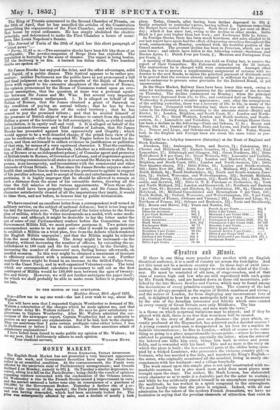Sir James Brooke has enjoyed the eclat, and the other
advantages, solid and liquid, of a public dinner. This festival appears to be rather pre- mature : neither Parliament nor the public have as yet pronounced a full and final judgment on the merits or demerits of the Rajah of Sarawak. Even with regard to his extensive slaughters of the natives of Borneo, the opinion pronounced by the House of Commons rested upon an erro- neous assumption, that the question at issue was a personal squab- ble between Sir James and Mr. Wise. But several very important questions still remain undiscussa 1. It is alleged on behalf of the Sultan of Borneo, that Sir James obtained a grant of Sarawak on the condition of paying an annual tribute ; that he has by force of arms extended the limits of the ceded territory ; that he has ceased to pay the promised tribute ; and that he availed himself of the presence of British ships of war at Borneo to extort from the terrified Sultan a grant of the territory in full sovereignty., which, as yiehled under intimidation, is in equity null and void. 2. It IS alleged on behalf of the late Lieutenant-Governor and Chief Justice of Labuan, that Sir James Brooke has proceeded against him oppressively and illegally ; which would appear to be a well-founded charge, if the prima facie view of the case be confirmed—that he suspended Mr. Napier before he heard his de- fence and then set himself to collect evidence in justification or palliation of OIL step, by means of a very equivocal character. 3. That the combina- tion of the offices of Rajah of Sarawak, (whether as a tributary of the Sul- tan of Borneo or as an independent prince,) of Consular agent and protector of British trade in Borneo, of Governor of Labuan, and of negotiator-general with a roving commission to all states in or around the Malayan waters, in his person, is an incongruity, and inconsistent with the commercial and other interests of G--e. at Britain. 4. That since Sir James Brooke enjoys a state of health that enables him to make tours in the provinces to agitate in support of his peculiar schemes, and to accept of feasts and entertainments from his partisans, it is highly improper that he should be allowed to remain at such a distance from the scene of his ostensible duties, drawing all the time the full salaries of his various appointments. When these alle- gations shall have been properly inquired into, and Sir James Brooke's character satisfactorily cleared of all the imputations they imply, it would be time then, and not before, to honour him by public testimonials.


























 Previous page
Previous page